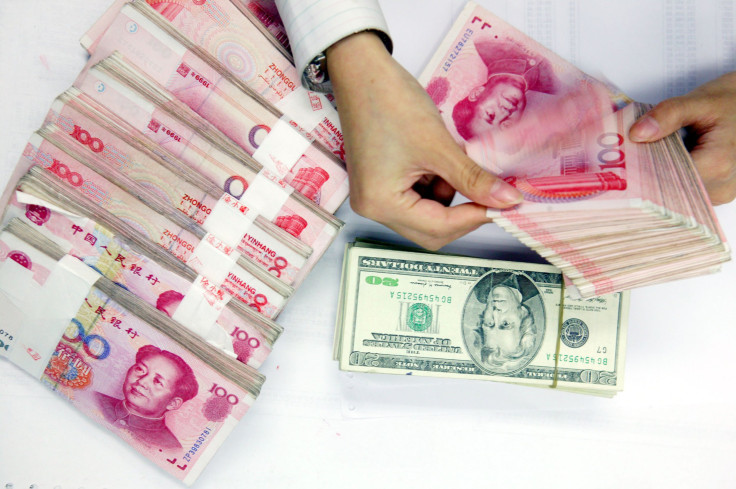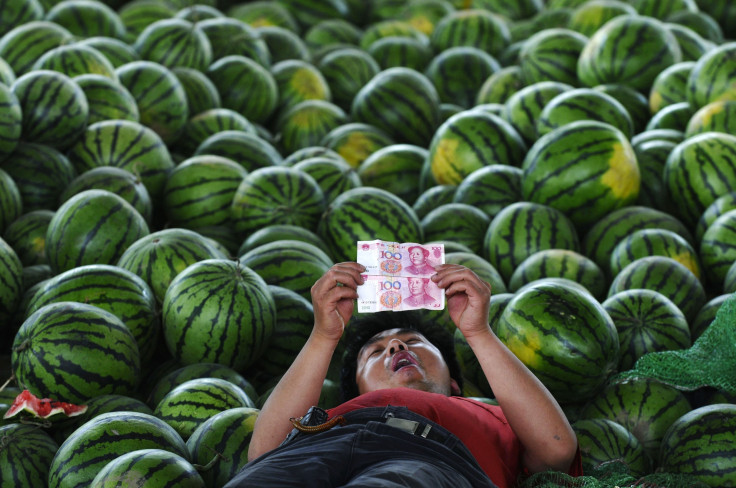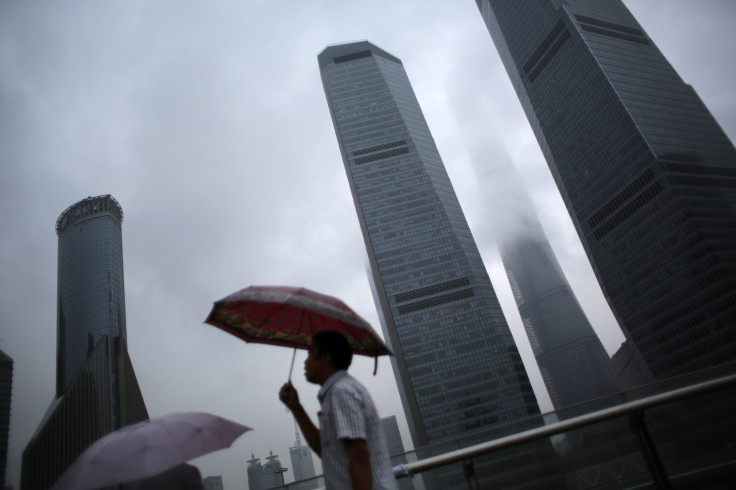US Interest Rate Hike Likely To Add To Downward Pressure On China's Yuan, But Some Analysts Say Falls May Be Less Than Predicted

SHANGHAI — In China there has been speculation for months about the impact of the U.S. Federal Reserve raising interest rates for the first time in almost a decade. Following the Chinese government's surprise devaluation of the yuan in August, amid an export slowdown, by some 3 percent, China has seen significant capital outflows -- and some analysts fear even larger sums of money will flow out of China and into dollars, to take advantage of the higher interest rates.
As a result, they argue, the authorities may have to spend significantly bigger sums intervening in money markets, and buying yuan from banks. Along with capital outflows, this could hit the availability of funds to boost China's economy, which has this year seen its slowest growth rate since the global financial crisis in 2009.
Now that the Fed has finally taken action, raising interest rates by 0.25 percentage points, reaction has been mixed -- with some observers saying the hike is relatively small, and the Fed's suggestions that further hikes would be gradual, and therefore the impact will be less dramatic than expected. Some analysts have also argued that the Chinese government is prepared to tolerate further depreciation up to a point -- not least because a cheaper yuan could help boost exports.

Shen Danyang, a spokesman for China’s Ministry of Commerce acknowledged Thursday that the U.S. rate increase “will have some direct or indirect impact on China’s external trade and international investments.” However, Shen said “further analysis” was required to “determine the extent” of the impact, the South China Morning Post reported.
Some observers said currency markets had already factored in a further depreciation in the value of the yuan. The Chinese currency has been at four-year lows against the dollar over the past week -- after China’s central bank, the People's Bank of China (PBoC), announced it was planning to end the pegging of the yuan to the U.S. dollar, though it did not give a timeframe for this. The strong dollar is seen to have pushed the yuan high against other currencies including the euro, damaging China’s exports to Europe -- and the PBoC said Friday it was introducing a new index that would measure the yuan's value against 13 currencies. Many analysts took this as a signal that the government was willing to allow its value to fall further against the dollar.
And Julia Wang, Greater China Economist at HSBC in Hong Kong, told International Business Times that the blow from the Fed's decision might be softer than some had predicted.
"It was a doveish hike, and the Fed also stressed that further rate hikes next year would be gradual," she said. "So emerging markets are seeing this with some relief. We think that the strengthening of the dollar may be limited -- and therefore the weakness of the yuan may be limited too."

Wang said this did not mean the yuan would not see some loss in value. "Unlike the U.S., China is cutting interest rates, so it should naturally allow the yuan to weaken. We expect it to fall to 6.7 to the dollar [from its current value of around 6.45] by the end of next year -- but that’s where we think it ought to be based on China’s current economic situation."
Chinese analysts also argued that the Fed’s rate hike would hit China less hard than other developing economies, according to local news website The Paper. They said growth, which stood at 6.9 percent in the last quarter, was still relatively high and said pressure on the yuan might increase in the second quarter of next year, but in the short term markets were already prepared. The PBoC said earlier this week that it expected the economy to grow by 6.8 percent next year -- above the expectations of many analysts. And it has also stressed that despite high outflows of around $87 billion last month, China's foreign exchange reserves remain sizeable, at $3.44 trillion, reducing pressure to prop up the yuan (though reserves are at their lowest level in almost three years).
Shares in China rose Thursday after the Fed's announcement: the main Shanghai Composite Index closed up 1.8 percent, while the secondary Shenzhen Composite Index was up 2.7 percent.
However local analysts told The Paper that the Fed’s move could bring "more challenges and risk." China has cut its own interest rates six times in the past year in an attempt to boost the economy by making borrowing cheaper, and is therefore not expected to follow the Fed in raising rates. As a result, analysts said further outflows were inevitable, and this could affect the availability of funds to invest both in China's stock market and the wider economy.
In its editorial, The Paper said the government had already spent “a lot of cash” in stabilizing the currency, and if it had to take further action this would add to the complexity of the task it faced in guiding the economy.

Sun Lijian of Shanghai’s Fudan University also noted that China’s economy and financial system were more interconnected to the global economy now, compared to nine years ago when the Fed last raised interest rates, according to the South China Morning Post. The Chinese yuan recently joined the International Monetary Fund’s Special Drawing Rights basket of reserve currencies, leading many analysts to predict that it would have to be allowed to fall further in the coming months, in order to conform to IMF criteria that it was a tradeable currency governed by market mechanisms.
And while further falls in the yuan's value could help China's exports, the boost could be limited, said Wang. And some observers have predicted the government would intervene to prevent any sharp depreciation, pointing out that Beijing could not allow a significant gap between the value of the yuan within China -- where currency controls mean it is partly protected from market forces -- and in offshore markets, where its value is more affected by global forces. (In midday trading Thursday, the domestically-traded onshore yuan was down 0.14 percent at 6.4816 to the dollar; while in offshore markets it was down 0.36 percent at 6.5477.)
“The key question for China in 2016 could be whether the country can reconcile potentially conflicting imperatives on domestic and external financial stability,” said an analyst from Fitch Ratings, the South China Morning Post reported.
There were also concerns in Hong Kong about the impact of the Fed rate hike, the paper said. Hong Kong’s Monetary Authority, unlike China, did raise its own rates in line with the U.S. hike. However, its head still warned of “some capital outflows,” and observers said this could deal a further blow to the city's already slowing property market.
© Copyright IBTimes 2024. All rights reserved.





















